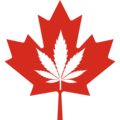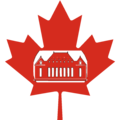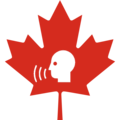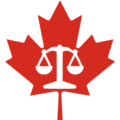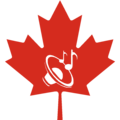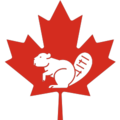Portal:Canada
| Showcase | Contents | Contributing |
Introduction
Canada is a country in North America. Its ten provinces and three territories extend from the Atlantic Ocean to the Pacific Ocean and northward into the Arctic Ocean, making it the world's second-largest country by total area, with the world's longest coastline. Its border with the United States is the world's longest international land border. The country is characterized by a wide range of both meteorologic and geological regions. With a population of just over 41 million people, it has widely varying population densities, with the majority residing in urban areas and large areas of the country being sparsely populated. Canada's capital is Ottawa and its three largest metropolitan areas are Toronto, Montreal, and Vancouver.
A developed country, Canada has a high nominal per capita income globally and its advanced economy ranks among the largest in the world by nominal GDP, relying chiefly upon its abundant natural resources and well-developed international trade networks. Recognized as a middle power, Canada's support for multilateralism and internationalism has been closely related to its foreign relations policies of peacekeeping and aid for developing countries. Canada promotes its domestically shared values through participation in multiple international organizations and forums. (Full article...)
Featured article -
The Invasion of Quebec (June 1775 – October 1776, French: Invasion du Québec) was the first major military initiative by the newly formed Continental Army during the American Revolutionary War. The objective of the campaign was to seize the Province of Quebec (part of modern-day Canada) from Great Britain, and persuade French-speaking Canadiens to join the revolution on the side of the Thirteen Colonies. One expedition left Fort Ticonderoga under Richard Montgomery, besieged and captured Fort Saint-Jean, and very nearly captured British General Guy Carleton when taking Montreal. The other expedition, under Benedict Arnold, left Cambridge, Massachusetts, and traveled with great difficulty through the wilderness of Maine to Quebec City. The two forces joined there, but they were defeated at the Battle of Quebec in December 1775. (Full article...)
Current events
- May 1, 2025 – 2025 Southwest United States measles outbreak
- North America's three largest measles outbreaks continue to expand, with over 2,500 confirmed cases. There have been three fatalities in the United States and one in Mexico. The outbreaks began in Ontario, Canada, then surged in Texas and New Mexico, and have quickly escalated in Chihuahua, Mexico. (AP News)
- April 28, 2025 – 2025 Canadian federal election
- Voters in Canada go to the polls to elect the 343 members of the House of Commons to the 45th Canadian Parliament. (BBC)
- The Liberal Party under leader Mark Carney is projected to form government for the party's fourth consecutive mandate, with Carney remaining prime minister. (The Globe and Mail)
- Conservative Party leader Pierre Poilievre and New Democratic Party leader Jagmeet Singh lose their seats, with the NDP also losing official party status in the House. Each make speeches conceding the election, with Singh announcing his intention to resign as party leader. (CTV News)
- April 27, 2025 – 2025 Vancouver car attack
- The death toll from yesterday's vehicle-ramming attack at a street festival in Vancouver, British Columbia, Canada, rises to eleven with at least 20 others injured, making the attack tied for the deadliest vehicle-ramming attack in Canadian history. The British Columbia Prosecution Service charges the perpetrator with eight counts of second-degree murder, while investigators also rule out terrorism. (CTV News) (AP)
- April 26, 2025 – 2025 Vancouver car attack
- Nine people are killed and several others injured, after a car is driven through a crowd at a Philippine-Canadian festival in Vancouver, British Columbia, Canada. (Al Jazeera)
Selected panorama -
Woody Point, Western Newfoundland. Panorama of the Gros Morne National Park with the Tablelands, overlooking Bonne Bay
Credit: Tango7174
National symbol -
The Canada goose (Branta canadensis), sometimes called Canadian goose, is a large species of goose with a black head and neck, white cheeks, white under its chin, and a brown body. It is native to the arctic and temperate regions of North America, and it is occasionally found during migration across the Atlantic in northern Europe. It has been introduced to France, the United Kingdom, Ireland, Scandinavia, New Zealand, Japan, Chile, Argentina, and the Falkland Islands. Like most geese, the Canada goose is primarily herbivorous and normally migratory; often found on or close to fresh water, the Canada goose is also common in brackish marshes, estuaries, and lagoons. (Full article...)
Selected vital article -
The military history of Canada spans centuries of conflicts within the country, as well as international engagements involving the Canadian military. The Indigenous nations of Canada engaged in conflicts with one another for millennia. The arrival of European settlers in the 17th century led to new alliances and hostilities among Indigenous nations and colonial powers, leading to conflicts such as the Beaver Wars. (Full article...)
Selected picture -
Featured biography -
Terrance Stanley Fox (July 28, 1958 – June 28, 1981) was a Canadian athlete, humanitarian, and cancer research activist. In 1980, having had one leg amputated due to cancer, he embarked on a cross-Canada run to raise money and awareness for cancer research. The annual Terry Fox Run, first held in 1981, has grown to involve millions of participants in over 60 countries and is the world's largest one-day fundraiser for cancer research; over C$900 million has been raised in his name through the Terry Fox Research Institute as of September 2024. (Full article...)
Did you know -

- ... that Canadian rapper Apt Exact, who has been described as "not gangster", was elected to the Legislative Assembly of British Columbia in 2024?
- ... that the first Miss Indigenous Canada contestants were judged on ambassadorship, character, community service, and cultural involvement?
- ... that journalist Bob Moir posed as medical staff on the Canadian Olympic team to report on the Munich massacre?
- ... that more than one million applications for the Canadian Dental Care Plan were approved in its first three months?
- ... that as a teenager in a B'nai B'rith camp in Canada, Holocaust survivor and future Canadian ambassador Fred Bild learned English from his camp counselor, future actor William Shatner?
- ... that Robert Home was sent by the British Army to Canada in 1864 to report on the defence of the frontier against the eventuality of an American invasion?
- ... that in 1819 Michael O'Sullivan, a member of the Legislative Assembly of Lower Canada, fought a duel in Montreal with William Caldwell over a proposal to create the Montreal General Hospital?
Featured list -
Canada's national parks are protected areas under the Canada National Parks Act, owned by the Government of Canada and administered for the benefit, education, and enjoyment of the people of Canada and its future generations. National parks are administered by Parks Canada, a Crown agency operating under the jurisdiction of the Ministry of Environment and Climate Change. The goal of the national parks system is to set aside lands representing the country's 39 distinct natural regions described in the National Parks System Plan, primarily to protect the ecological integrity of the land, and secondarily to allow the public to explore, learn about and enjoy Canada's natural spaces. (Full article...)
Main articles
Associated Wikimedia
The following Wikimedia Foundation sister projects provide more on this subject:
-
Commons
Free media repository -
Wikibooks
Free textbooks and manuals -
Wikidata
Free knowledge base -
Wikinews
Free-content news -
Wikiquote
Collection of quotations -
Wikisource
Free-content library -
Wikiversity
Free learning tools -
Wikivoyage
Free travel guide -
Wiktionary
Dictionary and thesaurus








